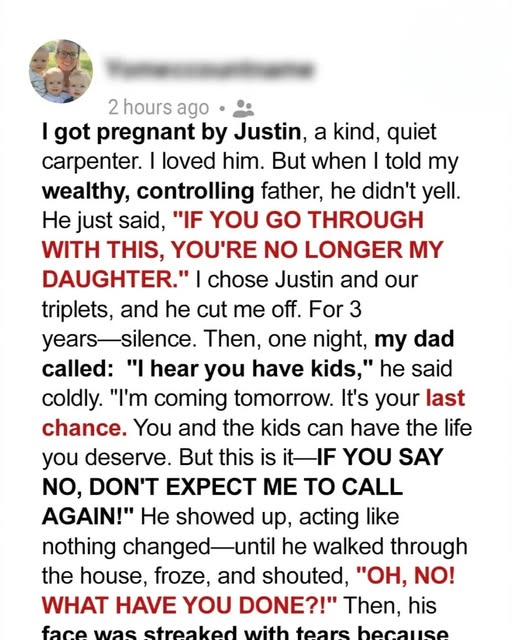My Dad Disowned Me for Marrying a Poor Man – He Broke Down When He Saw Me After 3 Years

My father’s last words to me before I left home still echo in my mind:
“If you go through with this, you’re no longer my daughter.”
I was twenty-five — young, hopeful, and newly pregnant. I was in love with Lucas, a humble carpenter whose hands carried both strength and sincerity. But to my father, Lucas’s lack of money made him unworthy.
That night, with my heart pounding and my future uncertain, I walked out of the house I’d grown up in — and into a life I’d have to build from the ground up.
The early months were rough. Lucas and I squeezed into his small one-bedroom home and worked tirelessly to stay afloat. We shared a single old car that barely ran, and every dollar had to stretch to its limit.
Then, life threw us another surprise — I was pregnant with triplets.
We were terrified, overwhelmed, and unprepared. Nights blurred into mornings as we tag-teamed diaper changes and bottle feedings. Some days, I cried from exhaustion. But through all of it, we clung to each other with a quiet determination. We didn’t have much, but what we had was real.
Lucas worked longer hours, taking whatever carpentry jobs he could. Slowly, his reputation grew. His hands built not only tables and cabinets but the foundation of our future. And little by little, the world began to shift in our favor.
The house started to feel warm — not from wealth, but from love, laughter, and the comforting smell of sawdust and home-cooked meals. I’d watch our kids play on the floor, surrounded by furniture Lucas had built himself, and feel a quiet pride bloom inside me.
We were building something money could never buy — something honest, earned, and deeply ours.
Then, after three years of silence, the phone rang.
It was my father. His voice was the same — stern, deliberate — but underneath it was something I hadn’t heard before: hesitation.
He said he wanted to visit. He said maybe there was still a way to “come back.”
The next morning, his sleek black car pulled into our driveway like a memory from another lifetime. When he stepped out, I barely recognized him — his hair grayer, his shoulders heavier.
He looked around as he entered our home. His eyes landed on the wooden shelves, the dining table, the children’s toys scattered across the floor — each one something Lucas had made with his own two hands.
Finally, he spoke.
“You’re… not struggling,” he said quietly, as if the words surprised him.
I told him the truth — that life hadn’t been easy, but it was good. That love, not money, was what made our home whole. That stability doesn’t come from wealth; it comes from work, trust, and gratitude.
He didn’t respond. He just nodded once, turned, and walked out the door.
I thought that was it. But an hour later, there was a knock.
When I opened the door, he stood there again — tears streaking down his face. The man who had once disowned me could barely look at me now. His voice trembled when he spoke.
“I was wrong,” he said. “I thought I was protecting you… but I was just afraid.”
He admitted that his pride had blinded him. That he equated success with money, and he couldn’t bear the idea of his daughter living a life without comfort. But seeing our home — small, simple, alive with love — had undone something inside him.
I didn’t need to say anything. I just opened my arms. He stepped forward and hugged me — a long, shaking embrace that felt like a door reopening after years of silence.
When he met the triplets, they ran to him with open arms, laughing and calling him “Grandpa” without hesitation.
He bent down, covered his face, and cried — not from regret, but from relief.
In that moment, there were no apologies big enough, no speeches needed. The anger and pride that had stood between us melted away, replaced by something gentler, truer.
He stayed for dinner that night. Lucas made stew, and the kids chattered nonstop. My father sat quietly, watching the family he’d once turned his back on — the family he now longed to be part of.
Before he left, he took my hand and said, “I don’t deserve your forgiveness.”
I shook my head. “It’s not about deserving,” I said softly. “It’s about choosing love over pride.”
He nodded, eyes glistening, and smiled through the tears.
That night, after everyone went to bed, I sat by the window, listening to the rain and thinking about the past three years. The pain, the struggle, the isolation — and now, the peace.
Sometimes it takes losing everything you thought you needed to discover what really matters.
We had built our life from the ground up, with splinters in our hands and love in our hearts. My father finally saw that.
He came back the next weekend with a small gift — a wooden rocking horse. It wasn’t store-bought. He had made it himself.
When he handed it to Lucas, something unspoken passed between them — mutual respect. Two men, very different, but both builders in their own way.
And as our children climbed onto the rocking horse, giggling, I realized something simple yet profound: forgiveness isn’t about erasing the past. It’s about letting it heal.
My father had once disowned me for choosing love over wealth. Now he saw that love had made me richer than money ever could.
He didn’t just get his daughter back that day. He found himself again — and a family that had been waiting, patiently, for his heart to come home.